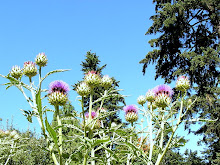I am continually looking for new places to buy my food. Living in Portland there are so many choices. When I first moved here I ended up living in a house across the street from Fred Meyer (i.e. the Northwest's version of Kroger). Because of this I ended up doing most shopping at this horrendous semi-localized version of Wal-Mart. The only good thing: using the self-checkouts to charge myself the conventional price for organic food. They actually had a really good organic/natural section of food. But the shopping experience was soul-killing. I also did some of my shopping at Trader Joe's for about the first 6 months- 1 year of living here.
At first Trader Joe's seemed like this amazing cornucopia of good food for really cheap prices. Little by little I realized that the majority of the food isn't that great. Sure, Trader Joes is good for things like a big jar of (mediocre) olives or the occasional bag of walnuts. But it's not a good place to do your regular weekly grocery shopping.
In the past I had always lived with one or multiple roommates who worked at Wild Oats or (since the merger) Whole Foods. Enjoying a 20% discount and not cooking at home very much, these specialty natural grocery stores didn't seem very expensive to me. Now Whole Foods seems insanely expensive. So, that is pretty much out of the question. Also I am getting more and more skeptical of Whole Foods and the corporate-industrial organic/natural food world. Industrial is really the key word here.
I am reading a book called
Agrarian Dreams: The Paradox of Organic Farming in California by Julia Guthman. I highly recommend it if you are interested in the way that organics went from being a radical social movement to becoming an industry. I'm also reading
The Way We Eat: Why our Food Choices Matter by Peter Singer and Jim Mason. Although Singer's writing has a tendency to annoy me because I find him a bit patronizing, it has made me think (again) about food choices and the politics of eating.
I moved about a year ago, away from the Fred Meyer to a neighborhood with a Safeway that is two blocks from my house. It's wonderful having a closeby grocery store and I really appreciate it since so many urban neighborhoods are food deserts, but I despise this Safeway. It is overpriced (products seem to be outrageously marked up at this location for some reason), bad selection, lots of expired stuff, lots of out of stock products all the time, and they never have enough people working so you end up standing in line forever!
In the warm months I try to go to the farmer's market once a week because a.) i enjoy the atmosphere and experience and b.) i like supporting local farmers using sustainable farming methods. But what to do in the winter? You might have read my last posting on CSAs - I'm thinking of doing that this spring. But I actually have found two amazing local grocery stores to shop at recently.
The first,
Uncle Paul's Produce Barn, bills itself as a "year-round farmer's market." They sell only produce and (for the most part) local produce. Prices are very reasonable and the quality is always great. It is basically a tent (not an actual building) which is probably one reason they are able to keep prices affordable. I've been shopping there for about a year now.
More recently (a few weeks ago) I discovered the wonderful
Sheridan Fruit Company. Less than a mile from my apartment and probably my favorite grocery store I've ever found shopped at. It is a full-service old-school grocery store with a deli, a good wine section, a decent beer section, mostly local (yet mostly affordable) produce with quite a bit of organics. Also a giant bulk section with all kinds of dried beans (one of my weaknesses), dried fruit, grains, etc. Also lots of specialty ethnic products like every shape of pasta you can think of. I love this place. Why aren't there more places like it? How do they survive? How do they manage to keep prices affordable? Shopping here is enjoyable, there is a sense of place and a sense of history (they've been in business since 1916). Anyway, I've finally found my grocery store.











